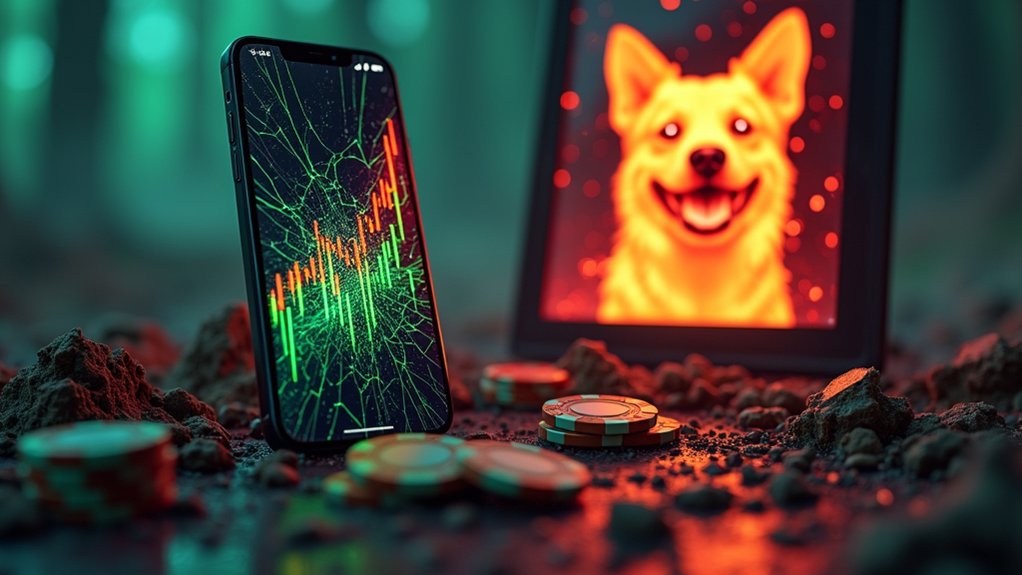Memecoins and meme stocks, far from harmless internet fads, share a dangerous bond as speculative bubbles, driven by reckless hype, not fundamentals, and thriving on social media chaos. They seduce naive investors with viral memes and anti-establishment bravado, mocking rational markets while risking crippling losses, as seen with Dogecoin’s empty jests and GameStop’s absurd surges. Stop romanticizing this nonsense—demand accountability before the digital wildfire consumes all. There’s more to uncover beyond this surface madness.

A digital wildfire, memecoins and meme stocks blaze through financial markets, fueled not by fundamentals, but by the fickle whims of internet hype. This isn’t investing; it’s gambling, dressed up in memes and Reddit threads, where value hinges on viral tweets rather than balance sheets. Dogecoin, born from a dog meme, and GameStop, propelled by online outrage, exemplify this absurdity—assets skyrocketing not on merit, but on mob sentiment. Why are we falling for this?
Look closer, and the connection is glaring: both memecoins and meme stocks thrive on social influence, not substance, exploiting tight-knit online communities on platforms like Twitter and TikTok. They seduce with humor or rebellion, promising quick riches, while lacking utility or stability—a cruel jest on the gullible. Investors, lured by shared laughs or anti-establishment fervor, ignore the stark reality: these are speculative traps, volatile and vicious, ready to implode at the first shift in digital mood. Daily trading volumes for memecoins often exceed billions, reflecting the sheer scale of this speculative frenzy exceed billions. Isn’t it time to question this madness?
Memecoins and meme stocks thrive on social hype, not substance, luring investors with humor and rebellion into volatile, speculative traps. Question this madness now.
Social media, the puppet master, amplifies this chaos, driving prices with hashtags, not data, and disrupting markets while institutional investors scramble to adapt. Volatility reigns, risks soar, and scams—like the infamous Squid Games coin—lurk, preying on the naive. Regulatory concerns mount, yet protections lag, leaving the reckless exposed to crippling losses. Are we so dazzled by internet clout that we’ve abandoned reason? Retail investors, through accessible apps, have fueled surges like GameStop’s peak beyond $400, challenging traditional market norms accessible apps fueled surges. Reddit’s cryptocurrency subreddits have become influential hubs where collective sentiment can quickly translate into dramatic market movements.
This isn’t a game; it’s a reckoning. Memecoins and meme stocks mirror a market unmoored, where sentiment trumps sense, and global reach only spreads the contagion faster. Will we learn before the next crash, or keep chasing digital fool’s gold? The clock’s ticking—stop romanticizing this nonsense and demand accountability, before the wildfire consumes us all.
Frequently Asked Questions
What Are the Origins of Memecoins?
The origins of memecoins trace back to 2013 with Dogecoin, created by Jackson Palmer and Billy Markus as a humorous take on a viral Shiba Inu meme, blending internet culture with cryptocurrency innovation.
How Do Meme Stocks Impact Markets?
Meme stocks greatly impact markets by driving volatility through social media sentiment. Their rapid price swings, fueled by retail investors, challenge traditional analysis, increase trading volume, and heighten both liquidity and investment risks.
Are Memecoins a Safe Investment?
Evaluating whether memecoins are a safe investment reveals significant risks. Their extreme volatility, lack of fundamental value, and regulatory uncertainty make them highly speculative, often leaving investors vulnerable to substantial financial losses.
Why Do Meme Stocks Gain Popularity?
Meme stocks gain popularity through social media hype, where online communities and retail traders drive interest. Their rapid price spikes, fueled by speculation rather than fundamentals, attract attention, amplifying their appeal and volatility.
Can Memecoins Have Real-World Utility?
The potential for memecoins to possess real-world utility is evident. They can support charity, gaming, microtransactions, and community governance, though their speculative nature and regulatory challenges often hinder broader, practical adoption and integration.








